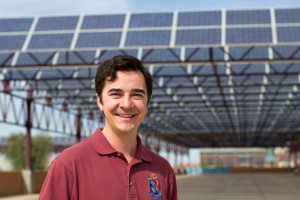
Steven Limpert, a recent graduate in electrical engineering from Arizona State University, is the 2012 Fulbright Postgraduate Alumni Scholar, and also is the inaugural winner of the 2012 Fulbright U.S. Climate Change Scholarship.
Through his Fulbright, Steven will spend a year at the University of New South Wales (UNSW), undertaking work towards a PhD at the UNSW School of Photovoltaic and Renewable Energy Engineering where he will conduct research in the area of high efficiency, hot carrier, and nanostructured solar cells.
“At UNSW, I will work experimentally to verify data I obtained from novel simulations of solar cells at the Arizona State University Solar Power Laboratory,” Steven said.
In the simulations he conducted at the ASU Solar Power Laboratory, Steven studied a variety of energy loss mechanisms in solar cells such as surface recombination and carrier thermalisation. Surface recombination occurs in a solar cell when an electron and a hole recombine at the perimeter of the crystal lattice and become no longer capable of providing their energy to a load. Carrier thermalisation is a process in which electrons and holes lose energy to heat, decreasing the energy which they are able to provide to a load.
“A large body of work exists describing the effects of recombination at the front, back and in the interior of solar cells, but the literature largely neglects the effect of recombination at the edges of solar cells. Previously, edge recombination may have been considered a negligible loss mechanism, but the results of my simulations showed that high edge recombination rates can have a large detrimental effect on the performance of certain types of solar cells,” Steven said.
A conclusion of the study was that if losses due to edge recombination are controlled, higher energy conversion efficiencies can be achieved.
“If higher energy conversion efficiencies are achieved, the same materials can provide greater power output, thus effectively reducing the price of the power obtained from the device.”
In addition to his BS in electrical engineering from Arizona State University, Steven has been the recipient of several scholarships and awards including a Travel Study Grant from the Circumnavigators Club Foundation and a Dean’s Fellowship from Arizona State University. He is also a part-time professional musician, and plays the trumpet.
he prestigious Fulbright program is the largest educational scholarship of its kind, created by U.S. Senator J. William Fulbright and the U.S. Government in 1946. Aimed at promoting mutual understanding through educational exchange, it operates between the U.S. and 155 countries. In Australia, the scholarships are funded by the Australian and U.S. Governments and corporate partners and administered by the Australian-American Fulbright Commission in Canberra.
